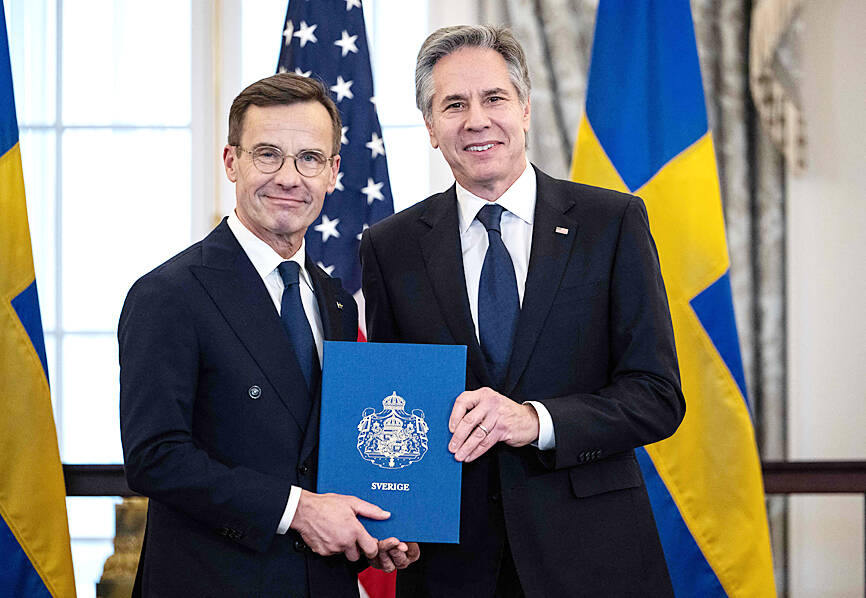Sweden on Thursday became the 32nd member of NATO, turning the page on two centuries of non-alignment and capping two years of diplomacy after Russia’s invasion of Ukraine.
Days after Hungary followed key holdout Turkey and became the last NATO member to sign off, Sweden ceremonially handed over accession documents to the US.
Swedish Prime Minister Ulf Kristersson attended as a guest at the state of the union address of US President Joe Biden in Washington.

Photo: AFP
“Mr Prime Minister, welcome to NATO, the strongest military alliance the world has ever seen,” Biden said as he recognized Kristersson, who sat in the gallery next to first lady Jill Biden.
Biden urged the US House of Representatives to approve billions of dollars in military aid to Ukraine, saying that “I will not bow down” to Russian President Vladimir Putin.
“If anybody in this room thinks Putin will stop at Ukraine, I assure you he will not,” Biden said.
Kristersson, at an accession ceremony at the US Department of State, called joining NATO “a major step, but at the same time, a very natural step.”
“It’s a victory for freedom today. Sweden has made a free, democratic, sovereign and united choice to join NATO,” he said.
He later delivered a televised address to the nation from Washington, saying: “We are a small country, but we understand more than most the importance of the greater world beyond our borders.”
US Secretary of State Antony Blinken said that few would have expected Sweden as well as Finland to join NATO before Putin ordered the invasion of Ukraine in February 2022.
There is “no clearer example than today of the strategic debacle that Putin’s invasion of Ukraine has become for Russia,” Blinken said.
Ukrainian President Volodymyr Zelenskiy also hailed Sweden’s membership, saying: “One more country in Europe has become more protected from Russian evil.”

US PUBLICATION: The results indicated a change in attitude after a 2023 survey showed 55 percent supported full-scale war to achieve unification, the report said More than half of Chinese were against the use of force to unify with Taiwan under any circumstances, a survey conducted by the Atlanta, Georgia-based Carter Center and Emory University found. The survey results, which were released on Wednesday in a report titled “Sovereignty, Security, & US-China Relations: Chinese Public Opinion,” showed that 55.1 percent of respondents agreed or somewhat agreed that “the Taiwan problem should not be resolved using force under any circumstances,” while 24.5 percent “strongly” or “somewhat” disagreed with the statement. The results indicated a change in attitude after a survey published in “Assessing Public Support for (Non)Peaceful Unification

The CIA has a message for Chinese government officials worried about their place in Chinese President Xi Jinping’s (習近平) government: Come work with us. The agency released two Mandarin-language videos on social media on Thursday inviting disgruntled officials to contact the CIA. The recruitment videos posted on YouTube and X racked up more than 5 million views combined in their first day. The outreach comes as CIA Director John Ratcliffe has vowed to boost the agency’s use of intelligence from human sources and its focus on China, which has recently targeted US officials with its own espionage operations. The videos are “aimed at

SHIFT: Taiwan’s better-than-expected first-quarter GDP and signs of weakness in the US have driven global capital back to emerging markets, the central bank head said The central bank yesterday blamed market speculation for the steep rise in the local currency, and urged exporters and financial institutions to stay calm and stop panic sell-offs to avoid hurting their own profitability. The nation’s top monetary policymaker said that it would step in, if necessary, to maintain order and stability in the foreign exchange market. The remarks came as the NT dollar yesterday closed up NT$0.919 to NT$30.145 against the US dollar in Taipei trading, after rising as high as NT$29.59 in intraday trading. The local currency has surged 5.85 percent against the greenback over the past two sessions, central

STEADFAST FRIEND: The bills encourage increased Taiwan-US engagement and address China’s distortion of UN Resolution 2758 to isolate Taiwan internationally The Presidential Office yesterday thanked the US House of Representatives for unanimously passing two Taiwan-related bills highlighting its solid support for Taiwan’s democracy and global participation, and for deepening bilateral relations. One of the bills, the Taiwan Assurance Implementation Act, requires the US Department of State to periodically review its guidelines for engagement with Taiwan, and report to the US Congress on the guidelines and plans to lift self-imposed limitations on US-Taiwan engagement. The other bill is the Taiwan International Solidarity Act, which clarifies that UN Resolution 2758 does not address the issue of the representation of Taiwan or its people in